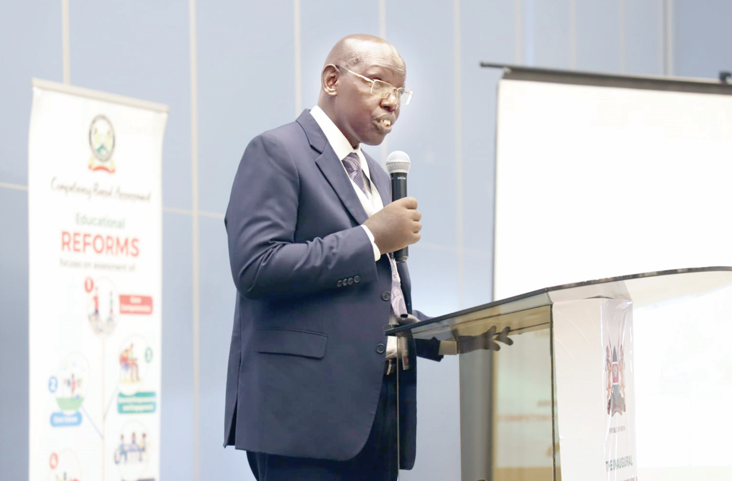State stops police officers from supervision of learners’ exams
By Irene.Githinji, April 26, 2024Education Principal Secretary Dr Belio Kipsang has said police officers will no longer supervise learners during Grades Six and Nine assessments.
Kipsang yesterday said under Competency Based Education (CBE), there will be changes to administering assessment though the officers may continue to assist in Grade 12 and Form Four examination.
“This is the most opportune time to change how we administer assessments. In Grade 12 or Form 4, because of the stakes we still place there, we will still continue doing what we have been doing but in assessment we will run away from that type of environment so that we can give children an opportunity to be children,” said the PS.
He was speaking on the second day of the Competency Based Assessment (CBA) symposium organised by Kenya National Examination Council (KNEC).
By the time learners do the summative Kenya Primary School Education Assessment (KPSEA) in Grade 6, Kipsang said they have already done 60 per cent through School Based Assessment (SBA), supervised by their teachers.
Continuation of SBA
He explained that from Grade 4, learners take assessment that will cumulatively go into the learners’ assessment report at KPSEA, adding that it is a continuation of SBA, which has been between the teacher and learners
“When doing that assessment, it was between the child and teacher. So why should we be so worried about the 40 per cent that we must get somebody else to support us in that assessment?” the PS posed.
He added: “As we move forward with assessment at Grade 6, we will give an opportunity for teachers to take lead in their progress. We are just saying it is a continuation of a school based assessment and therefore people who have been engaged in that assessment have been two, the teacher and pupil. So in Grade 6 we will leave them to continue what they have been doing.”
School and national report
The PS also explained that progression reports will be issued in Grades Six and 9.
These will include learners, school and national reports that will be used to make critical decisions at different levels.
“There will be learners’ reports as they progress to the next level, the school report to support in areas they need to improve in terms of learners’ outcome while the national report will tell us where we need to support our teachers, facilities we need to improve among others,” the PS said.
He said it is only in Grade 12 that they will get a certificate because that exam will support the learner in being placed into a course either in a TVET institution or university or use it to get into a career.
“The certificate will take you into the world of work or into the next level of career training,” he explained.
At the same time, the PS said that in about three weeks, a stakeholders’ engagement forum will be held to discuss pathways and placement in senior schools, adding that secondary schools will soon be categorized according to the pathways they will offer. Going into the future assessment will be anchored on formative and summative to give children an equal opportunity saying that in the past, eight years of learning were determined in three days through Kenya Certificate of Primary Education (KCPE) exams.
KNEC Chief Executive Officer (CEO), Dr David Njengere has stated that a pilot for summative assessment will be conducted in 235 schools, five from every county, in June.
“As part of preparations for summative assessment at Grade 9, we will develop tools for a pilot to be conducted in sampled schools in June. By October, we will issue sample papers to inform every learner at junior school of how they will be assessed at Grade 9,” Njengere explained.
He also explained that placement of learners on pathways or tracks at senior schools will be based on achievement tests, interest and alternative assessment.
Similarly, he noted that they will not rely on achievement tests only, adding that alternative assessment will help in responding to needs of every learner’s potential to help them in picking the most appropriate pathway as they transition to the next level.
